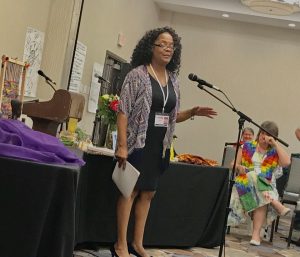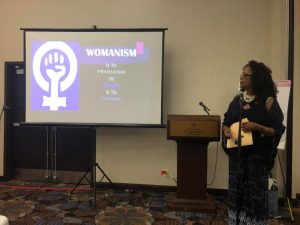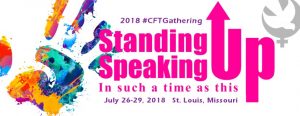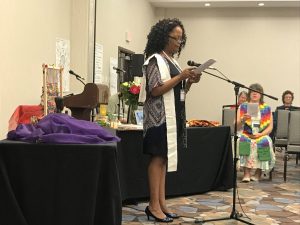Christian Feminism Today 2018 Gathering—Rev. Dr. Leslie Harrison

Rev. Dr. Leslie Harrison inspired and challenged us at the Christian Feminism Today Gathering worship service and in her workshop “Don’t You Forget About Me: Black Female Issues Rarely Addressed by Society in Her Context.” The theme of the Gathering was “Standing Up, Speaking Up in Such a Time as This,” based on Esther 4:14.
In the Sunday morning worship service Rev. Dr. Harrison led this powerful responsive “Prayer for the People—For Such a Time as This” that she wrote:
Leader: We know, through our DNA, all of us come from the four corners of the earth.
We have been oppressed, depressed, segregated, and amputated.
Oppressed by a patriarchal system and each other.
Depressed by those who refuse to acknowledge our gifts, our intelligence, and our wisdom.
Segregated from our fullest expression based on gender, race, sexuality, and so many other distinctions.
Amputated from our thoughts, our spirits, our experiences, and our futures.
However, we stand tall and speak with strength because we were created . . .
All: For such a time as this.
Leader: We give thanks to our Creator for all the good works which prepared this world for our entrance.
We give thanks to the Creator for orchestrating our emergence into time, to
maximize our usefulness as co-laborers in the restoration of justice.
We give thanks to our ancestors for being stepping stones to wisdom and
cornerstones of strength as we embrace these many challenges . . .
All: For such a time as this.
Leader: We will stand up and speak up to overcome oppression, depression, segregation, and amputation.
No longer will we sit mute in moments of injustice.
We will stand up and speak up because each life matters.
We will stand up and speak up because everyone should be able to live out their dreams.
We will stand up to march, we will speak up to raise consciousness, and we will
use our dollars to change the economics of political injustice . . .
All: For such a time as this.
Leader: We will fast, just as Queen Esther called for a fast.
We will turn over our plates to actions which perpetuate selfishness, greed, discrimination, stigma, poverty, and hate.
We will stand tall filled with indignation, audacity, courage, valor, moxie, and boldness
to right that which is wrong and demeaning whenever and
wherever necessary. . .
All: For such a time as this.
Leader: We will work to free our siblings who are bound by archaic traditions and regulations.
We will strengthen systems that are just, uplifting, and uniting.
We will assist the oppressed, depressed, segregated, and amputated.
We will move toward the enactment of justice for all . . .
All: For such a time as this.
Leader: We will stand up, we will speak up, we will lift up, and we will turn up.
We will invite ourselves to the table when and where decisions are being made.
We will walk boldly and decide our own fate.
We will stand up to demand justice for ourselves and others.
We will speak up for those who have been silenced . . .
All: For such a time as this.
Leader: Our ancestors, all genders, all races, all creeds, proved that we have the ability to
stand and speak up even in the face of great adversity.
It is their examples that we were created to follow, to pursue justice with dignity and courage.
All: We remember who we are and what our ancestors accomplished.
We stomp out injustice, share hope, tolerate only that which is good and just, and teach that love conquers all.
We are the ones who ensure our neighbors feel welcome.
We do the right things for the right reasons at the right times.
We are the ones standing up and speaking up,
For such a time as this.
© 2018 Leslie Harrison. Used by permission.
 Later in the worship service Rev. Dr. Leslie Harrison delivered an inspiring sermon titled “For Such a Time as This.” She highlighted three strong female voices in the book of Esther.
Later in the worship service Rev. Dr. Leslie Harrison delivered an inspiring sermon titled “For Such a Time as This.” She highlighted three strong female voices in the book of Esther.
Queen Vashti, she says, is one of King Xerxes beautiful trophies. “King Xerxes is as drunk as a skunk, and he wants his trophy to come down” so he can show her off to all the men at his lavish banquet. “The queen says ‘there’s no way I’m marching around all those men. He’s got the wrong woman here.’ Vashti stands up and speaks up: ‘No. I’m not giving up my pride and self-esteem.’”
The second strong woman is Esther. “She’s an orphan; all her family is gone but a distant cousin, Mordecai.” Leslie continues: “When the king asks for all the beautiful women, Mordecai says, ‘go ahead and apply for the scholarship.’ Esther’s learning stuff. But Mordecai is crying and is a hot mess. She didn’t know there was stuff happening outside the walls of the castle. Esther says if I go before the king, it will be bad. So I’m going to keep living. I’m not doing anything. Her cousin says ‘don’t think you got up into royalty just for yourself. You’re there for a purpose. Do what you need to do.’ So she goes before the king, probably anticipating her death. But she does it anyway. And the king welcomed her.” Because she stands up and speaks up, Esther saves her people.
Rev. Dr. Harrison identifies the third voice in the book of Esther as Christ-Sophia. “Her name isn’t spoken, but it is Christ-Sophia moving in the hearts of people, giving Esther the wisdom to do what Godde asks. It is Christ-Sophia who gives Esther the courage, and it is the presence of Christ-Sophia that changes the heart of the king to accept Esther as she is.”
Rev. Dr. Harrison applies the Esther story to our lives, saying that some of us are living a privileged life. “And we see the people wailing outside the gate. How many of us are willing to hear what the needs of the people are? How many of us are willing to give a kind word? How many of us are willing to share the wisdom we have? Think about how we can go down to the wall. Why are the mothers crying? Because their babies were taken away. Because of inhumane immigration practices. Because there’s a wall.”
“We are tired of being tired. But we can’t be so tired we go somewhere and lie down. We have to stand up. Stand up against injustice. Let us find the courage and energy we have in Christ-Sophia to stand up and speak out. Because it’s for such a time as this.”
 On Saturday morning Rev. Dr. Leslie Harrison also challenges us in her workshop titled “Don’t You Forget About Me: Black Female Issues Rarely Addressed by Society in Her Context.” Here is her workshop description:
On Saturday morning Rev. Dr. Leslie Harrison also challenges us in her workshop titled “Don’t You Forget About Me: Black Female Issues Rarely Addressed by Society in Her Context.” Here is her workshop description:
“Black females are the foundation of America. We nursed our babies and the master’s babies at the same breast; we nurtured and trained the master’s children hoping to keep our children from being sold further into slavery. We walked away from slavery but remained slaves of our husbands, families, and a society that refused to acknowledge our presence, our power, and our debilitating issues. Over the years, we have learned to stand tall and speak up through our actions rather than our voices. During the Civil Rights movement, it was our tired and sore feet that desegregated buses and marched for equality. We did not become a major part of the early feminist movement because so many of the issues did not pertain to us. We love America; we would die for America. And now we ask America, ‘Don’t you forget about me!’”
Drawing from womanist theology and literature, Leslie begins with a famous quote from Alice Walker: “Womanist is to feminist as purple is to lavender.”
Leslie names some experiences in the history of African American women:
- oppressed
- voiceless
- misrepresented
- miseducation of children
- deletion of role models
- distortion of image
- alienation from known history
- dehumanization of race and culture
- Middle Passage—slaves, bonded servants
- separation from family and neighbors
- stripping of identity
- increasing of inner strength
She continues by naming and celebrating some African American women who laid the foundation of feminism and womanism and some who are continuing this work:
- Frances Ellen Watkins Harper, author, orator, social reformer and founding member of the National Association of Colored Women
- Katherine Ferguson, whose freedom was bought by a friend for $200, and who established the first Sunday School in New York
- Sojourner Truth, who delivered her famous “Ain’t I a Woman” speech at the Ohio Women’s Rights Convention in 1851
- Esther Cooper Jackson, civil rights activist, social worker, and founding editor of the political and literary journal Freedomways
- Claudia Jones, immigrant from Trinidad, journalist who wrote against gender and racial discriminatory practices, whose best known piece was “An End to the Neglect of the Problems of the Negro Woman”
- Mary Church Terrell, advocate for civil rights and the women’s suffrage movement, charter member of the NAACP, one of the founders of the National Association of Colored Women
- Angela Davis, emphasized triple oppression of racism, sexism, and classism experienced by black women, who said: “ I am no longer accepting the things I cannot change. I am changing the things I cannot accept. “
- Anne Moody, author, civil rights activist, who wrote Coming of Age in Mississippi about her experiences growing up poor and black
- Amandla Stenberg, actress, created video “Don’t Cash Crop on My Cornrows,” calling out the appropriation of black culture: “What would America be like if we loved black people as much as black culture?”
- Solange Knowles, actress, singer, songwriter, uses music as her form of activism, number-one album titled A Seat at the Table
- Alice Walker, author, activist, introduced word “womanist” to emphasize exclusion of women of color in early feminist movement and to focus on the intersectionality of racism, sexism, and classism
Leslie further emphasizes that womanism focuses on the experience of black women and the well-being of all. She says, “I refuse to be an ‘angry black woman.’ I’m an energy conservationist.”
My thanks goes to Dr. Christy Sim for the photos from the Gathering.

Rev. Dr. Leslie Harrison is a listener, a friend, and a voice for the voiceless (until they find their voice!). She recently completed her doctorate in Marriage and Family Therapy at Eastern University. Her Master of Divinity is from Palmer Theological Seminary. She is an Itinerant Elder of the African American Episcopal (AME) Church. As a life coach, she is passionate about helping people live into their dreams and purpose. Leslie currently works as pastor and chaplain at AtlantiCare Regional Medical Center in Atlantic City, New Jersey, and in its hospice program. She is vice-coordinator of the CFT Council. Among Council members and in our online community, Leslie is beloved for her gift of earnest and eloquent prayer.


Thanks Jann for highlighting me in your blog. I am truly honored. Please note I am an Itinerant Elder of the African METHODIST Episcopal (AME) Church. God is truly amazing! It was my joy to be a part of this great experience.
Thank you, Leslie, for your amazing worship and workshop leadership and for giving me permission to include your powerful responsive prayer in this blog post. I am honored!
I made the change you noted in your bio.